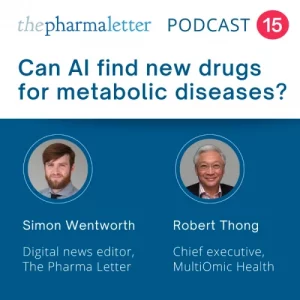The Pharma Letter Podcast — Episode 15 — Can AI find new drugs for metabolic diseases?

Interest in the potential for artificial intelligence to transform different aspects of the drug discovery and development process is at an all-time high.
According to industry analyst GlobalData, the number of AI deals in pharma has doubled in the last three years, reaching 85 in 2021, and more pharmaceutical companies are hiring for AI roles than ever before.
Another way of gauging interest is to look at the number of AI-based patents granted over time, with analysts recording a three-fold increase since 2015.
While the broad picture is clear, a detailed look at where this activity is focused reveals that not all therapy areas have received the same level of attention, with oncology attracting much of the interest.
One UK-based company is looking to transform the way metabolic disorders are treated, leveraging many of the same AI-based techniques used to great effect elsewhere.
MultiOmic Health is targeting a huge area of unmet medical need and a panoply of conditions including diabetes, heart disease, liver disease and kidney disease.
Together, such metabolic disorders account for the largest proportion of the world’s healthcare spend, nearly $2 trillion, with that amount set to rise as global populations age.
In this week’s episode of The Pharma Letter Podcast, MultiOmic chief executive Robert Thong discusses his firm’s progress and ambitions for the future.


